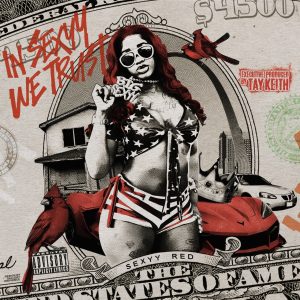Album review overview: Airbag, AURORA and more
Dozens of new albums arrive at Maxazine’s editorial staff every week. There are way too many to listen to them all, let alone review them. It ensures that too many albums are left behind. And that’s a shame. That is why today we post an overview of albums that arrive at the editors in short reviews.
Airbag – The Century of the Self
“The Century of the Self”, the sixth studio album by Airbag, will be released on June 14th. The lyrics (covering topics such as cancel culture, fear, and judgment) reflect our modern world. Their distinctive style, with tempo and volume changes, can be heard in tracks like “Dysphoria” and “Tyrants and Kings.” “Awakening” features both acoustic and electric guitar. The first part is quite mellow in tone, but that changes, along with the emotion. Especially noteworthy are the transitions in “Erase.” “Tear it Down” has a calm, intriguing start. In this epic piece, the keyboards take centre stage. The minimalist section, with subdued vocals, resonates with me. The tranquillity is well chosen. There is a clear build-up towards the end. “The Century of the Self” is quite somber. The balance between low tones and high tones (such as from the keyboard) is excellent. Additionally, everything is well distributed across the headphones. While there are few major surprises, there are certainly plenty of beautiful elements, including fantastic guitar playing and lovely bass lines. (Esther Kessel-Tamerus) (8/10) (Karisma Records)
AURORA – What Happened To The Heart?
“What Happened To The Heart?” originated from a letter that inspired the Norwegian singer to explore what has happened to the human heart and how modern society has lost its spiritual connection. And unfortunately, that’s not the only thing that’s been lost. Through introspective tracks like “Echo Of My Shadow” and “Your Blood,” AURORA takes the listener on a journey from vulnerability to strength, with themes of self-healing, political awareness, and personal growth at the forefront. Rather ethereal and minimalist. And yet… On the album, Aurora collaborated with, among others, Ane Brun, Tom Rowlands of The Chemical Brothers, and Dave Hamelin. It was to no avail. An album full of tracks that might fit the Eurovision Song Contest, but likely in the bottom ranks. All in all, not particularly exciting. (Norman van den Wildenberg) (5/10) (Decca)
Gus Rodríguez – De Jazz en Cuando
With “De Jazz en Cuando,” Gus Rodríguez presents a new album that celebrates the rich rhythmic and musical treasures of the Caribbean. An impressive celebration of Latin jazz, seamlessly weaving traditional elements with modern influences, resulting in a refreshing and captivating listening experience. From the opening track, “Camino a CASA 21,” the listener is immediately immersed in a musical journey that highlights both the simplicity and complexity of jazz. “Jakagua” and “In The Tropical Forest” showcase the versatility of Rodríguez and his band, seamlessly blending tropical influences and classic jazz elements. “De Jazz en Cuando” offers a harmonious blend of tradition and innovation, and thanks to the Dolby Atmos version, the listening experience is taken to unprecedented levels. With this album, Gus Rodríguez not only honours the rich history of Latin jazz but also adds a new chapter to this ever-evolving genre. (Norman van den Wildenberg) (8/10) (La Oreja Media Group Inc)
Tidiane Thiam – Africa Yontii
With “Africa Yontii,” Tidiane Thiam delivers an above-average album that captures the essence of West African music. This album, consisting of nine delightfully laid-back tracks, offers a subtle yet powerful call for change and self-determination for Africa. A call we have heard many times before, still relevant with the decline of pan-African ideals but pertinent for those still living. Thiam’s guitar playing, learned by jamming along with late-night radio broadcasts, speaks volumes without words. Hailing from the serene Senegalese fishing village of Podor, also home to Baaba Maal, Thiam plays with a unique style that transports the listener to the shores of the Senegal River. The hypnotic calabash rhythms and repetitive guitar riffs of tracks like “Yangue” and “Nanka,” featuring Samba Ba and Alioune Ba, embed themselves in your mind and linger. Makhtar N’diaye’s calabashes, with how they are played, add a modern touch to the traditional sounds, giving the album a contemporary flair. The album cover, designed by Miles Wintner, and the dedication to the late Adama Niass add a personal touch to the whole experience. “Africa Yontii” may not be a masterpiece, but it is certainly an album worth listening to. For fans of West African music, it’s a delightful treat, and for anyone seeking an escape into enchanting rhythms, it’s an absolute recommendation. (Jan Vranken) (8/10) (Sahel Sounds)
Sexyy Red – In Sexxy We Trust
The new album from Sexyy Red, “In Sexxy We Trust,” is truly a nightmare. It’s hard to fathom how someone with this kind of ‘music’ has been given the time and resources to release an album. Janae Nierah Wherry, better known as Sexyy Red, has already stirred up quite a bit of controversy with her previous work, but with this album, she completely misses the mark. Let’s start with the ‘music’ itself. The album is filled with repetitive beats and uninteresting melodies that would drive even the most patient listener to despair. The production quality is abysmal, suggesting little to no effort was put into creating something worth listening to. But the biggest issue isn’t even the music; it’s the content. The lyrics are saturated with sexist and misogynistic language that nullifies any semblance of artistic value. The fact that someone like Sexyy Red, who asks on social media, “Can I fart in your mouth?” gets a platform at all is deeply concerning. It seems that the accessibility of music production nowadays allows for the creation of such abominations. The fact that people are willing and able to make money from this rubbish is a sad reality of the contemporary music industry. This is not a review, but rather a heartfelt plea and a desperate questioning of why. Why do we give artists like Sexyy Red the space to spread this kind of content? It’s high time we ask ourselves how we want to see the music world contribute something positive to our society. In short, “In Sexxy We Trust” is an album best avoided. It offers nothing of value and only contributes to the degradation of music culture. (Jan Vranken) (0/10) (Rebel.Gamma)
![]()










